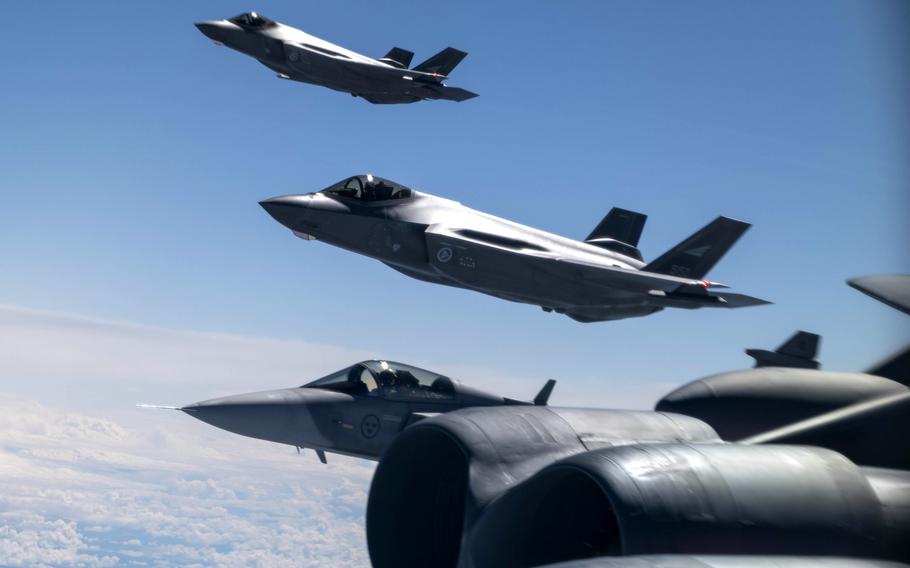
Norwegian air force F-35 Lightning IIs and a Swedish air force Saab JAS 39 Gripen fly off the wing of a U.S. Air Force B-52H Stratofortress during a mission over Europe on June 18, 2024. The head of U.S. European Command and NATO’s supreme allied commander, Gen. Christopher Cavoli, said July 18, 2024, that European allies have realized they must do more for their defense. (Emily Farnsworth/U.S. Air Force)
STUTTGART, Germany — American allies in Europe are aware that their “house is on fire,” sparking the kinds of military reforms that the United States has been seeking for years, the top U.S. commander on the Continent said this week.
“This is a different Europe from what we complained about for years,” U.S. European Command’s Gen. Christopher Cavoli said Thursday.
Cavoli, who also serves as NATO’s supreme allied commander, said Russia’s war in Ukraine has generated a sense of urgency in European capitals, where there is an awareness that Moscow will pose a long-term threat regardless of how the war turns out.
“I think it is underappreciated in the United States just how much our European allies have awakened to the fact that the house is on fire,” Cavoli said during a discussion at the Aspen Institute in Colorado. “This is not a show, and this is not just rhetoric. This is true concern about the stability of their continent and the survival of their states.”
Cavoli pointed to increased defense spending among allies in Europe and efforts underway to ramp up the Continent’s industrial base, which has diminished over the years. The Army general also said Europe’s invigorated military efforts will help the United States’ contribution in Europe “produce the most value.”
“This is exactly the moment when American interests will be advanced most by American continued participation,” he said.
But Cavoli’s comments come at a time of uncertainty over the future shape of the U.S mission in Europe, which could turn on the outcome of U.S. presidential election.
While the administration of President Joe Biden has shown intent to further boost military capabilities in Europe, last week announcing a plan to send long-range artillery and hypersonic missiles in the coming years, former President Donald Trump is likely to go in a different direction if he returns to the White House.
Trump’s running mate, J.D. Vance, has made it clear that a reduced American role in Europe is required so the United States can focus more on China.
“Trump is actually issuing a wake-up call to say that Europe has to take a bigger role in its own security,” Vance told an audience of global leaders at the Munich Security Conference in February.
Vance said the “American security blanket” in Europe has resulted in allies not taking enough initiative.
“The point is not we want to abandon Europe,” he said. “The point is we need to focus as a country on East Asia, and we need our European allies to step up in Europe.”
Among the major allies in Europe, investments are increasing. Poland, which now has the third-largest army in NATO behind the U.S. and Turkey, is spending about 4% of gross domestic product on its military.
Warsaw has said it’s looking to push that to 5%, well above NATO’s 2% benchmark.
Meanwhile, the United Kingdom said it will increase spending 2.5% of GDP, and Germany has now hit the 2% threshold after many years of falling short.
“Many nations are concluding that 2% is not enough, that they’re going to have to go higher than that,” Cavoli said.
Smaller allies on NATO’s eastern flank, such as the Baltic states and Romania, are among the top military spenders on a per capita basis.
“This is exactly the partner we’ve been looking for (in Europe) for three decades,” Cavoli said.